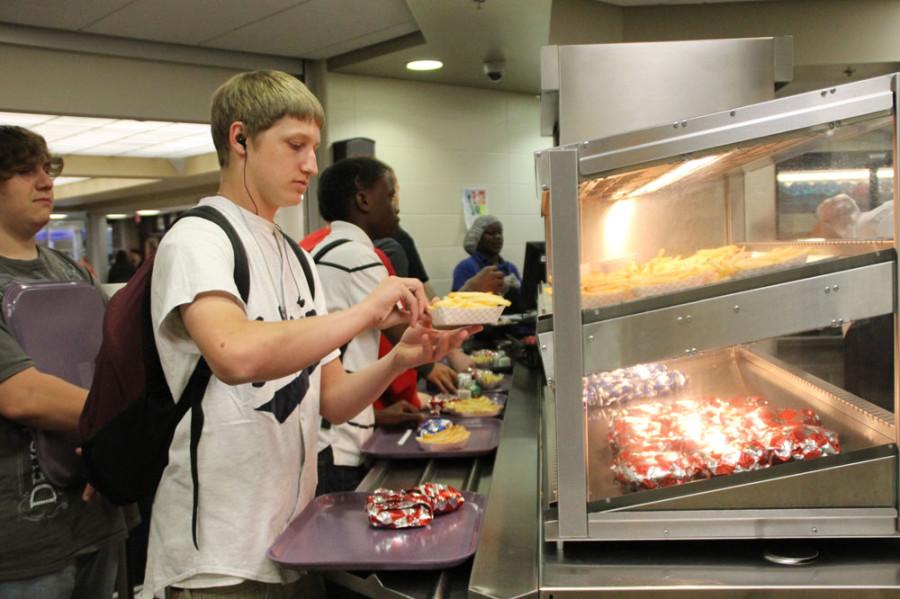New food regulations take place in July
Despite the rumors, vending machines will return with healthier options
Your heart probably sank to your stomach once you overheard the new circulating rumors, “Wayne Township schools will no longer supply students with vending machine food next school year.”
Wayne Township Food Service director Sara Gasiorowski is here to put an end to these new rumors.
“Vending machines will not be eliminated. However, the snack/beverage selections offered will have to comply with the ‘Smart Snack’ guidance,” she said.
What in the world is the “Smart Snack” guidance you may ask?
“Smart Snack” regulations are science-based nutritional standards released from the U.S.D.A.
These regulations allow schools to offer healthier snacks to students, while eliminating the various amount of junk food the student intakes during a school day. These national standards are all a part of the federal Healthy Hunger Free Kids Act of 2010.
Some students argue against the national school regulations, labeling the approach as “controlling” and “unfair”.
Gasiorowski quickly responded to change this common perception.
“The meals we are offer are very much a part of a student’s academic day, so we want to provide healthy, nutritious meals for students to be ready to learn in the classroom,” she said. “Classroom achievement – and future achievement – doesn’t depend solely on academics. A child’s health is a big factor, and children’s eating habits have an enormous impact on their health.”
Though we do not have to part ways with our beloved vending machines anytime soon, we will, however, notice several other changes as a result of the new regulations.
Gasiorowski discussed the various alterations that students will immediately notice next year.
“The Smart Snack regulations created numerous changes to our meal programs,” Gasiorowski said. “It will create changes in the food and beverage selections available to students not only through ala carte purchases at meal times, but for all foods sold on the school campus during the school day.
“Beginning next year the milk chugs must be 12 ounces or less,” she said, “so we have been working with our dairy distributor to help get the 16 ounce milk chugs repackaged to meet the new requirement.”
You will also notice that some of the most popular food items will vanish next year.
“Another change students will see is that some of the popular ala carte items such as chicken bites will no longer be available,” Gasiorowski said, “but we are finding really great replacement items that our students will enjoy.”
There will also be another major alteration that will this time go beyond the cafeteria, and that is sponsored fundraisers. They too, are not exempt from the new “Smart Snack” regulations.
“Each state determined the number of “exempt” fund-raisers (selling food that doesn’t meet the Smart Snack regulations). The State of Indiana issued guidance in March that allow two exemptions per school building per year for fund-raisers during the school day that don’t meet the Smart Snack standards,” she said. “Each school administrator will need to work with the clubs and organizations to determine how they will work within the guidance.”
How that change will affect our school fundraisers is still being discussed.
The final change is that portion sizes will decrease next year. Some will argue that decreasing proportion sizes will only be detrimental and cause students to leave the cafeteria unsatisfied.
Gasiorowski weighed in her thoughts about the matter.
“If a student purchases a complete lunch, they will have an average of 800 calories which is in range of the total calories needed by a teenager each day,” she said, “I totally understand that some students may need a higher caloric intake at lunch if they are involved in athletics.
“Offering ala carte items that meet the ‘Smart Snack’ regulations provide these students the opportunity to get the additional calories they need – but are more nutrient dense and healthier.”
Gasiorowski does not believe that national school food regulations will become stricter.
“No, I don’t think the regulations will become stricter. If anything, I think there will be some easing of some of the standards to make the program easier to implement,” she said. “We had an easing of standards last year to eliminate the limits on protein and grain servings, so USDA is listening to the concerns and challenges directors are facing. We all want what is best for our students to provide great meals every day that the students like and will eat.”
One thing is for sure; there will be some major changes taking place next year.
The question is: Will students stomach it?

Hi, my name is Brittany Baker. I am a senior and I have been with Spotlight for two years. I started off as a writer and then I moved up to News editor...












Lacey McLaughlin • May 5, 2014 at 8:02 AM
This is a wonderful story, as well as great motivation to understand the changes for our diets. Personally, I love my horrible-for-me diet, but I feel like a health kick, unwanted or not, is what most if not a vast majority of the students and staff need here at BD.